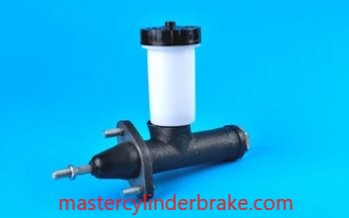The brake master cylinder is the heart of your vehicle’s braking system. It converts pressure applied to your pedal into hydraulic pressure that powers disc and drum brake inner cylinders.
If your master cylinder is malfunctioning, your brakes won’t function correctly and could lead to an accident. That is why it is critical to inspect your 240sx brake master cylinder for any signs of failure.
💥See also: The S10 Manual Brake Master Cylinder
Brake Pedal Feel
A positive brake pedal feel is an integral element of any vehicle’s ability to slow and stop quickly. If you’re experiencing soft or mushy pedal pressure, this could indicate an issue with your master cylinder which is preventing your brakes from working correctly.
The master cylinder is the cornerstone of your brake system, pumping brake fluid out through its lines to activate the piston in your caliper or wheel cylinder. Once closed, this caliper squeezes your brake pad firmly against its metal face.
Nowadays’ cars, trucks and SUVs rely on many components that form part of their hydraulic braking systems. Some components – like brake booster/vacuum servo – can significantly affect pedal feel.
Brake Pedal Leaks
If your 240sx brake pedal suddenly sinks to the floor without any resistance, this could be indicative of a brake fluid leak. This can be especially concerning if the car has been sitting for some time and its braking system hasn’t been used as frequently as usual.
Your master cylinder is responsible for providing hydraulic pressure to your calipers and wheel cylinders. Additionally, it contains a brake fluid reservoir which can be filled if any fluid loss occurs.
Brake master cylinders are typically composed of seals and valves that wear over time, creating leaks. This makes it difficult for fluid to pass through the master cylinder, potentially leading to a loss in pressure.
The most common reason why your brake pedal may go to the floor is a defective master cylinder or low brake fluid levels. To fix this problem, visit a professional or mechanic and have them perform repairs.
🎯Suggested article: 4 Wheel Disc Brake Master Cylinder
Brake Line Leaks
A leaking brake line can create an unsafe situation and should be addressed right away. Even minor leaks can have a significant effect on the efficiency of your braking system.
Leaking brake fluid is an issue commonly experienced with vehicles’ braking system and can be traced back to several sources. These include the seals of the master cylinder and, in drum brake systems, the wheel cylinder – where the caliper piston sits inside each brake drum.
Check your brake lines for signs of leakage or rusty spots. If you spot thin spots in the metal, replace them with new steel lines.
Brake Fluid
The brake master cylinder in your vehicle plays an integral role in how well your car stops. It converts pressure from your pedal into hydraulic pressure that is distributed to all individual braking components such as calipers or wheel cylinders for effective stopping power.
The master cylinder controls the amount of brake fluid in each circuit, ensuring an equal force is delivered to all four wheels simultaneously. In addition, brake fluid lubricates moving parts and absorbs moisture that may build up within your braking system.
If you observe a significant decline in your brake fluid level over an extended period, this could indicate there is an underlying leak. Your brake warning light may illuminate as well if this occurs.
To determine if your master cylinder is leaking, inspect it yourself and observe any evidence. If there appears to be wetness or gunk on either the inside or outside, then replacement of this component may be necessary.
🎯Suggested article: Land Rover Discovery 2 Brake Master Cylinder Repair Kit
